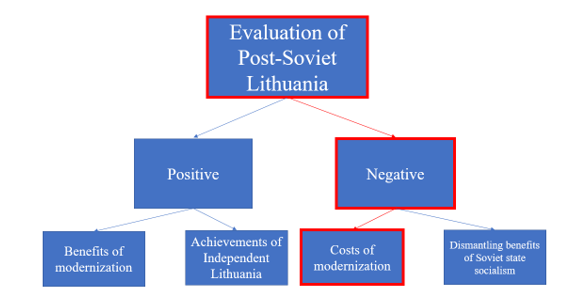By Adomas Traška and Paulius Vijeikis
Nostalgic feelings towards the Soviet era and discontent with the trajectories of Independent Lithuanian after 1990 noticeable in some segments of the society remains a serious political issue. It is often considered that these opinions are purely political and are related to the negative attitude towards liberal democracy and market economy, that have been established in the post-Soviet era when dismantling the Soviet system.
However, our qualitative research analysis has found evidence that some of the negativity towards Independence era is rather non-political – it is related to the perceived costs of (post)modernization process that took place after the fall of Communism.
Although the Soviet regime had tried to modernize Lithuania and to destroy all traditional aspects of life, these efforts were not entirely successful. Thus, the Soviet way of life and pre-modern living were actually coexisting quite harmoniously in rural areas. After Lithuania regained its Independence in 1990, (post)modernization process accelerated. This process was not political in itself and it resulted in traditional rural life being practically destroyed. Therefore, those who long for the pre-modern way of life tend to associate it positively with the Soviet era. This means that, in part, they are not nostalgic for the Soviet system and its specific attributes per se (state socialism and its perceived benefits) that were destroyed after 1990 (that is a completely different type of political reasons of discontent). Rather, they are looking back to their precious pre-modern rural life that managed to survive under the USSR but was inadvertently wiped out after regaining Independence.
This thesis has been suggested by some recurrent motives among the fieldwork informants. 1) People often consider the present to be too complex and confusingly heterogenous as opposed to simple and homogenous traditional societies in the recent past. 2) The informants are troubled and emotional to witness the traditional farming fading away in (post)modern Lithuania – especially when talking about cows that seem to represent the previous traditional world. 3) Some people express their disappointment with the modern work ethics and modern jobs themselves – they see physical labor and laborers as honorable and worthy while regarding the current popular jobs to be somehow less valuable and workers to be lazy, as opposed to hard-working traditional society. 4) Our informants tend to perceive the state of morality as declining since 1990. In part, they associate it with the secularization – this would be logically incompatible with nostalgia for the officially atheist USSR. 5) People also think that informal communality and trust in others is now lost as compared to the Soviet era but, importantly, they stress non-Soviet types of communities and activities. 6) Rural inhabitants consider family ties to be breaking down because of modern way of living – there was nothing specifically “pro-family” in the Soviet system but pre-modern society was essentially based on familial ties.
It is clear that all these categories of negative attitudes toward the Independence era are not directly related to the dismantling of the Soviet system as such because they never have been specifically Soviet in the first place. Rather, it seems that they are perceived flaws of non-political (post)modernization process of the pre-modern rural society that has managed to survive the Sovietization but broke down after 1990.
To conclude, this non-political discontent with the Independence era is often intertwined with a political type of discontent – people may not separate these categories and think of themselves as longing for the Soviet era per se. Nevertheless, the fact that to some extent negativity towards Independence era is non-political, related to (post)modernization and is not really pro-Soviet, might suggest a new way to see those expressing their disappointment the present.

See the recorded conference report here [Lithuanian].
About methodology
In summer 2020 IIRPS VU (VU TSPMI) Students’ Scientific Society led by prof. dr. Ainė Ramonaitė carried out a fieldwork in rural areas of Lithuania. The initiative was a part of “Lithuanian National Electoral Study 2020” and its results were presented in the conference “Lithuania after the Seimas elections 2020” on 26 March, 2021. We decided to share some of the students’ papers in this blog.
The fieldwork took place in a small town (appr. 5000 people) and a village (appr. 300 people) on 5-6 August, 2020 (notably – before the second wave of COVID-19). The area differs from Lithuania as a whole in terms of its electoral choices in the Seimas elections in 2020 – conservative Homeland Union and Lithuanian Socialdemocratic Party were way less popular here, while the Farmers and Greens Union (former governement party), Labour Party and Liberal Movement gained significantly more votes than in the rest of the country.
The chosen fieldwork method was semi-structured qualitative interview. During the field research a team of 8 people took 20 interviews, usually, between 30 and 60 minutes in length. The researchers chose variety sampling. There were 9 males and 14 females in the sample (contrary to the researchers’ wishes sometimes 2 people participated simultaneously). Among them there were people with higher, vocational or high-school education, old age pensioners, students, workers and unemployed people. 4 of the informants fall in to the 20-35 age category, 3 to 35-50 category, 8 to 50-65 and 8 were older than 65.
Later, the qualitative interview analysis has been carried out in three rounds. Firstly, the interview transcripts have been coded into different themes (some of which are reflected by the topics of the conference papers). Secondly, each theme has been assigned two researchers who would then inductively code their theme independently from one another. Finally, the codes have been discussed, agreed upon and analyzed by both researchers.
Rich qualitative data gave students a better understanding about the inner logic, feelings and actions of Lithuanian people and they’d like to share it with the political science community.